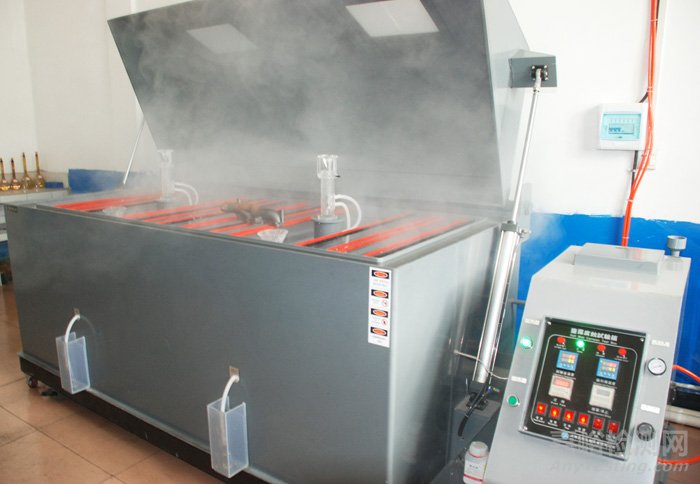The salt spray test is an environmental test that mainly uses the artificial simulated salt spray environmental conditions created by the salt spray test equipment to evaluate the corrosion resistance of products or metal materials. The products that need to be subjected to salt spray test are mainly some metal products, and the corrosion resistance of the products is examined by testing, such as steel wire rope, high zinc iron wire, steel plate, etc.
Salt spray corrosion
Corrosion is the destruction or deterioration of materials or their properties under the action of the environment. Most corrosion occurs in the atmospheric environment, which contains corrosive components and factors such as oxygen, humidity, temperature changes, and pollutants. Salt spray corrosion is a common and most destructive atmospheric corrosion. The salt fog mentioned here refers to the atmosphere of chloride, and its main corrosion component is the chloride salt in the ocean – sodium chloride, which mainly comes from the ocean and inland saline-alkali areas. The corrosion of salt spray on the surface of metal materials is caused by the electrochemical reaction of the chloride ions contained in the metal surface through the oxide layer and protective layer of the metal surface and the internal metal. At the same time, chloride ions contain a certain amount of hydration energy, and are easily absorbed by pores and cracks on the metal surface to displace and replace oxygen in the oxide layer, turning insoluble oxides into soluble chlorides, and making the passive surface an active surface. . Cause very bad adverse reactions to the product.
Salt spray
Salt spray refers to a dispersion system composed of salt-containing tiny droplets in the atmosphere. It is one of the three-proof series of an artificial environment. Many enterprise products need to simulate the damage caused by the surrounding climate of the ocean. The salt spray test is to simulate this. The occurrence of this phenomenon, so the detection equipment – salt spray test box should be run.
The salt spray test is divided into two types: neutral salt spray and acidic salt spray. The difference is that the standards and test methods are different. Also known as “NSS” and “CASS” tests, it is the most common test in artificial three-proof climate. method.
Box material: The whole test box is made of imported PVC reinforced rigid plastic plate, with a smooth surface, aging resistance, and corrosion resistance; easy to clean, no leakage, abandoning the fiberglass material structure that will cause surface fading and fibrillation due to time.
Material of box cover: Made of the fully transparent imported impact-resistant sheet, which is convenient for observing the test condition of the test sample during the test.
Saltwater tank material: imported PVC board, super large saltwater tank design, to prevent the test from being interrupted due to lack of salt water.
High-pressure air pipe material: copper pipe or rubber pipe.
Saturated air barrel: imported high-grade stainless steel (SUS304) plate; Henry’s law is used to heat and humidity, and provide the humidity required for the experiment. (Saturated air bucket function: heating, humidifying, and oil filtration for the compressed air).
All pipes in the test chamber are made of thickened fluorosilicone rubber pipes.
Experiment method
Neutral salt spray test (LRHS-108-RY)
Salt spray test (LRHS-270-RY)
Acetic acid salt spray test (LRHS-412-RY)
Copper accelerated vinegar instinct test
High temperature damp heat test
Test temperature
Neutral salt spray test: laboratory: 35℃±1℃, b. Saturated air barrel: 47℃±1℃;
Acid corrosion test: laboratory: 50℃±1℃, b. Saturated air barrel: 63℃±1℃, can also be set according to JIS, CNS, and other standards.
Guideline
Salt spray test reference standard:
GB/T 2423.17, IEC60068-2-11, ISO4628-3, ASTM B117, JIS-Z2371, JIS-G3141, GJB 150.1, MIL-STD-810F, MIL-STD-883E, etc.
Measure to judge
The purpose of the salt spray test is to evaluate the salt spray corrosion resistance quality of the product or metal material, and the judgment of the salt spray test result is the judgment of the product quality. The key to corrosion quality. The judgment methods of the salt spray test results include rating judgment method, weighing judgment method, corrosive substance appearance judgment method, and corrosion data statistical analysis method.
Rating Judgment
It is to divide the percentage of the ratio of the corrosion area to the total area into several grades according to a certain method and use a certain grade as the basis for qualification, which is suitable for the evaluation of flat samples.
Weighing judgment
It is a method of weighing the weight of the sample before and after the corrosion test and calculating the weight of the corrosion loss to evaluate the corrosion resistance quality of the sample. It is especially suitable for evaluating the corrosion resistance quality of a certain metal.
Corrosive
It is a qualitative judgment method. It is used to judge whether the product has a corrosion phenomenon after the salt spray corrosion test. This method is mostly used in general product standards.
Corrosion data
It provides methods for designing corrosion tests, analyzing corrosion data, and determining the confidence level of corrosion data. It is mainly used for analyzing and statistic corrosion conditions, rather than being used to determine the quality of a specific product.





